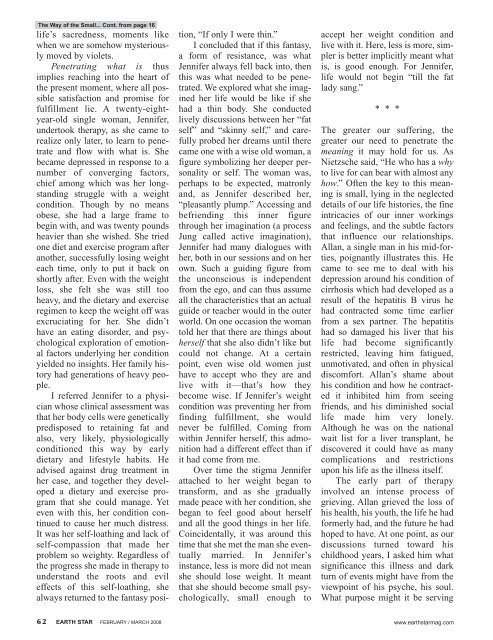GREGG BRADEN GREGG BRADEN - Earthstar
GREGG BRADEN GREGG BRADEN - Earthstar
GREGG BRADEN GREGG BRADEN - Earthstar
- No tags were found...
Create successful ePaper yourself
Turn your PDF publications into a flip-book with our unique Google optimized e-Paper software.
The Way of the Small... Cont. from page 16life’s sacredness, moments likewhen we are somehow mysteriouslymoved by violets.Penetrating what is thusimplies reaching into the heart ofthe present moment, where all possiblesatisfaction and promise forfulfillment lie. A twenty-eightyear-oldsingle woman, Jennifer,undertook therapy, as she came torealize only later, to learn to penetrateand flow with what is. Shebecame depressed in response to anumber of converging factors,chief among which was her longstandingstruggle with a weightcondition. Though by no meansobese, she had a large frame tobegin with, and was twenty poundsheavier than she wished. She triedone diet and exercise program afteranother, successfully losing weighteach time, only to put it back onshortly after. Even with the weightloss, she felt she was still tooheavy, and the dietary and exerciseregimen to keep the weight off wasexcruciating for her. She didn’thave an eating disorder, and psychologicalexploration of emotionalfactors underlying her conditionyielded no insights. Her family historyhad generations of heavy people.I referred Jennifer to a physicianwhose clinical assessment wasthat her body cells were geneticallypredisposed to retaining fat andalso, very likely, physiologicallyconditioned this way by earlydietary and lifestyle habits. Headvised against drug treatment inher case, and together they developeda dietary and exercise programthat she could manage. Yeteven with this, her condition continuedto cause her much distress.It was her self-loathing and lack ofself-compassion that made herproblem so weighty. Regardless ofthe progress she made in therapy tounderstand the roots and evileffects of this self-loathing, shealways returned to the fantasy position,“If only I were thin.”I concluded that if this fantasy,a form of resistance, was whatJennifer always fell back into, thenthis was what needed to be penetrated.We explored what she imaginedher life would be like if shehad a thin body. She conductedlively discussions between her “fatself” and “skinny self,” and carefullyprobed her dreams until therecame one with a wise old woman, afigure symbolizing her deeper personalityor self. The woman was,perhaps to be expected, matronlyand, as Jennifer described her,“pleasantly plump.” Accessing andbefriending this inner figurethrough her imagination (a processJung called active imagination),Jennifer had many dialogues withher, both in our sessions and on herown. Such a guiding figure fromthe unconscious is independentfrom the ego, and can thus assumeall the characteristics that an actualguide or teacher would in the outerworld. On one occasion the womantold her that there are things aboutherself that she also didn’t like butcould not change. At a certainpoint, even wise old women justhave to accept who they are andlive with it—that’s how theybecome wise. If Jennifer’s weightcondition was preventing her fromfinding fulfillment, she wouldnever be fulfilled. Coming fromwithin Jennifer herself, this admonitionhad a different effect than ifit had come from me.Over time the stigma Jenniferattached to her weight began totransform, and as she graduallymade peace with her condition, shebegan to feel good about herselfand all the good things in her life.Coincidentally, it was around thistime that she met the man she eventuallymarried. In Jennifer’sinstance, less is more did not meanshe should lose weight. It meantthat she should become small psychologically,small enough toaccept her weight condition andlive with it. Here, less is more, simpleris better implicitly meant whatis, is good enough. For Jennifer,life would not begin “till the fatlady sang.”* * *The greater our suffering, thegreater our need to penetrate themeaning it may hold for us. AsNietzsche said, “He who has a whyto live for can bear with almost anyhow.” Often the key to this meaningis small, lying in the neglecteddetails of our life histories, the fineintricacies of our inner workingsand feelings, and the subtle factorsthat influence our relationships.Allan, a single man in his mid-forties,poignantly illustrates this. Hecame to see me to deal with hisdepression around his condition ofcirrhosis which had developed as aresult of the hepatitis B virus hehad contracted some time earlierfrom a sex partner. The hepatitishad so damaged his liver that hislife had become significantlyrestricted, leaving him fatigued,unmotivated, and often in physicaldiscomfort. Allan’s shame abouthis condition and how he contractedit inhibited him from seeingfriends, and his diminished sociallife made him very lonely.Although he was on the nationalwait list for a liver transplant, hediscovered it could have as manycomplications and restrictionsupon his life as the illness itself.The early part of therapyinvolved an intense process ofgrieving. Allan grieved the loss ofhis health, his youth, the life he hadformerly had, and the future he hadhoped to have. At one point, as ourdiscussions turned toward hischildhood years, I asked him whatsignificance this illness and darkturn of events might have from theviewpoint of his psyche, his soul.What purpose might it be serving62 EARTH STAR FEBRUARY / MARCH 2008www.earthstarmag.com
















